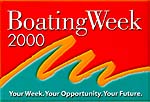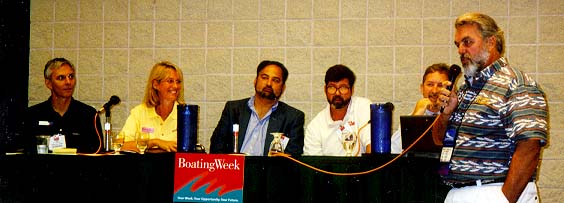 |
Meet the PressBoating Week 2000 |
 |
 |
Meet the PressBoating Week 2000 |
 |

 |
The PanelJoe Skorupa of Boats.Com, Louisa Rudeen of Motor Boating, Mike Sciulla of Boat US Magazine, Bill Sisson of Soundings and Soundings Trade Only and Mike Verdon of Boating World. Dean Travis Clarke of Boat Writers International served as moderator.
|

This forum was to provide some interaction between manufacturing executives, industry organization representatives and the press focusing on the concerns of the manufacturers and industry organizations.
Mike Verdon of Boating World: Most magazines do not meet editorial integrity. The advertising department is calling the shots. Deals are made for coverage for advertising pages. Nothing bad is ever said about the products. Warm reviews all the time. "This is the best boat ever built, it can even fly!"
Readers begin to inquire about why you only write good things.
At one dealer meeting, a manufacturer called the press their marketing partner!

Bill Sisson of Soundings and Soundings Trade Only: The editorial dept is not an adjunct dept to the advertising dept. The editorial dept is to serve the readers. The goal is to win new readers and keep the old ones.
Editorial space is not for sale. If you have a good product or service, you will get ink.
He is surprised by the number of companies that don't respond requests for new product info from the editors (for free coverage).
He gets calls like, "We are thinking about running some ads this year. What can you give us (speaking of editorial space)?.
Readers of his publication are well heeled, have owned several boats, they are very discriminating.
If a reader will find the information useful, helpful or safety issues are involved, you have to cover the bad things. You can build credibility with your readers and advertisers like that.
What is takes to grow your readership is not always similar to what it takes to grow the industry (in response to Mr. Keeter's comment in the Meet the Brass session).
Prepublication reviews (send article to a manufacturer for review prior to publication) are a slippery slope. You do need fact checking by section, not of feature stories.
About providing increased coverage of certification and access issues - they survey 2000 readers a month on which stories they like. He thinks certification and access articles would be at the bottom of the list of those stories most fully read.

Mike Sciulla of Boat US Magazine: He jokingly said, " I am troubled by what I have heard here this morning, there is much too much agreement in the air."
The more credible the review, the more effective it is.
He is a lobbyist (spends one month lobbying and then one month as an editor). They are an advocacy publication.
They promote boaters rights, access, etc.
They are not necessarily interested in current products or the news of the day.
Their publication has a very high renewal rate, 85%. Basically you either get out of boating or you die.
We know our markets. We live month by month by our circulation.
Over the last 20 years, there has not been much growth in the area of boating publications. The industry is flat (boat sales).
One thing that needs to be done is to create a credible relationship with the readers.
"A rising tide does raise all boats."

Louisa Rudeen of Motor Boating: She gets calls from manufacturers saying they (the publication) did not cover one of their products. The magazine needs to be made aware of them and have an opportunity to interact with the products.
A challenge manufacturers have is to find out which magazines cover their products and who the specific contacts for those types of products at that publication are.
Yes, her publication does call and ask for slides tomorrow. Some manufacturers provide CDs full of images. Motor Boating loves them.
When it comes time to test, often access is difficult or not as much time as needed. The quality of the article is proportional to the amount of time allowed in the boat.
Now, with heavy sales, they may sell the boat before they get time to test it.
Either don't ask us to test at dealers, or send factory people to the dealer site. Dealers are often not as knowledgeable as you might think.
Editors will show up every time we can for educational sessions.
We need feedback. Usually only get a scribbled note if their boat is on the cover, saying "Nice Cover."

Joe Skorupa of Boats.Com: Many types of new media are available: CDs, DVDs, cable broadcasts, event sponsorships. Each offers the industry a chance to grow. A few companies are using some of these media. The media have certain barriers and fears. He urged the manufacturers to "get over it" and try the new media.
Many manufacturers are using the tried and true methods. There has been little change. Its not too late to get involved in the new media opportunities.
There are three groups of people.

Many magazines are in coastal areas and can test locally.
Bill Sisson of Soundings and Soundings Trade Only: "How to" stories and a good read (adventure story, survival story, etc.)
If you go to a harbor, 90 percent of the boats are old. Readers want cruising and "how to" articles. Those who just bought boats are reading for interest or to be entertained.
A boat manufacturer mentioned they get a lot of "how to" questions. He thinks writers should address them more.
In the last month or two if a boater followed the advice in some publications they would either endanger their life or incur significant expense (in repairing the damages).
Maintenance articles are often written by "Joe Blow" who is a detailer.
Sometimes evaluations (boat or product reviews) are very personal. Imagine a great big guy doing a car evaluation for a little guy. The writer needs to be subjective, but objective. He may write, "This didn't work for me, but ... ." Suppose a tall guy could not stand up in a boat cabin. He failed to mention he was 6 ft. 8 inches tall.
You can't find prices for boats online. This industry has a long history of underestimating the consumer.
Instead of covering Ship Shape TV on Speedvision, where can I get more information on electroplating?
Several reports (reviews) are too nice.
Every magazine calls the day before and wants everything FedEx'd, they must own stock in them.
Magazines face a 90 day lead time, it forces them to be like the Sunday paper (get your stories and comics in way early). They need to go to a 30 day lead time.
Move to the "ing" story (boatING, etc).
Louisa Rudeen of Motor Boating said they could not do anything about the 90 day lead time problem. They must get their materials to the printers and wait.
How can you guys do it much faster? Monthly car magazines seem to get previews out faster?
We are stuck with 4 to 5 weeks at the printer and our own production time.
An attitude prevails, even if I don't need it tomorrow, FedEx it so I know I will get it and can track it.
Some publications now send 30 to 40 percent of there photos electronically.
CD Rom photos are usually of good quality. E-mailed photos are usually of poor quality.
Too much first person reporting. Need more interviews. Look to your advertisers and quote them. Get four or five guys who do that kind of thing (what you are writing about). I think there should be more interviews.

RBBI Comments:
Very interesting to hear these issues discussed. Not a many manufacturers
present, but we strongly commend those who were.
The concept of educational sessions being "put on" by the manufactures seemed very well received by both sides. Perhaps Boating Week 2001 might be a great place to stage a few of them???
I cringed when a publisher said NOTHING could be done about the 90 day lead time for printed magazines. I feel confident someone can whip that. Plus nobody mentioned the possibility of taking articles and reviews to the net first (they are completed before the 4 to 5 week wait at the printer). But, we also got caught up in a bunch of other activities and had difficulty promptly posting our coverage of this show. So we are certainly not perfect in this area either.
A big thanks to the panelists, Mr. Clarke and the BWI for putting this session together.
Perhaps an ongoing discussion of this nature could be hosted on the BWI site to allow some more interaction and real progress to be made in these areas, in addition to the annual discussions here??
After the conference, I received a BWI newsletter saying the "Brass" had agreed they would be willing to come back to another BWI meeting, but wanted a more specific set of topics. Mr. Clarke reports the "looseness" of these two sessions was necessary since this was the first forum of its kind. "More sessions will follow with more precise topics and format."

Return To Boating Week 2000 Main Page

Return to RBBI Home Page